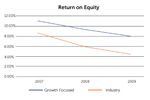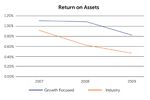GROWTH STRATEGIES FOR ANY ECONOMIC ENVIRONMENT - Haberfeld
←
→
Page content transcription
If your browser does not render page correctly, please read the page content below
GROWTH STRATEGIES FOR ANY
ECONOMIC ENVIRONMENT
By David Carlson
and Dr. Sean Payant
In times of uncertainty, organizations have a tendency to put the brakes on, losing
sight of long-term strategic initiatives and established growth goals. However, history
has taught us the decisions your bank makes today will have lasting implications for
tomorrow. Business as usual will return and our strategic initiatives and growth goals will
still be there. The key is to stay focused on growing core customers, regardless of the
economic environment. Here’s why.
David Carlson
Senior EVP,
Haberfeld More customers
cushion profitability
Having more customers is one of the best
ways to guarantee strong performance in all
economies. Banks executing a growth strategy
consistently have up to 2x the number of
customers per branch when compared to
industry averages.
Dr. Sean Payant
Chief Consulting To get a picture of how customers impact bank
Officer, performance, we need to turn to data compiled
Haberfeld
during the great recession of 2008. For context,
the average bank has approximately 1,100 retail
and business checking customers per branch.
Banks consistently executing a growth strategy
have approximately 2,200 retail and business
checking customers per branch.
An analysis of the data illustrates the impact
core customers have on Return on Assets (ROA)
and Return on Equity (ROE). What we learned
from the Great Recession was banks that stayed
focused on growth remained stronger. While
everyone was challenged, growth-oriented
banks fared much better. ROA declined less than
the industry average (26% for growth focused
vs. 56% for the industry), and ROE followed the
same trend. Just as important, those banks that
stayed the course through the crisis also came
back stronger on the recovery side.
While nothing can completely insulate your bank
from worsening financial performance during
an economic downturn, the data illustrates that
having more customers certainly helps.How do customers
cushion profitability?
Non-interest income: Banks executing a Relational intensity: Checking customers buy
growth strategy simply have more non- additional products and services. Growing
interest income. As the customer-base retail and business checking customers
increases, non-interest income also increases affords your bank first right of refusal on
– not because of regular service charges, other products and services 73% of the
but instead through more customers time, averaging 5.64 retail and 5.86 business
utilizing income producing services, such as product and service relationships.
interchange income (average of $60 p/a/p/y)
and valuing overdraft services (average of Loans from local markets: Having more
$90 p/a/p/y). customers also allows your bank to lend
more money to more people in your local
The following charts illustrate the impact that communities. These loans tend to have less
focusing on growth and having significantly risk.
more customers has on non-interest income.
Keys to accelerating
customer growth
Get the product right: People hate fees.
Compressed margins and decreased
profitability can lead to the discussion of
increasing monthly service fees or adding
minimum balance requirements. Below is
recent research on the criteria consumers
use when selecting a banking provider.
Interestingly, comparing consumers of all
ages with consumers under 40 years of age
produces very little difference as it relates to
what people desire.
More low-cost funding: 70% of the time,
the first product purchased at a bank by a
consumer household is a checking account.
It’s 55% of the time for businesses. Checking
deposits are the lowest cost funding available,
with business checking deposits having a
cost of funds less than .01%; this translates
into improved NIM.Compression in bank earnings will have little 2) Targeted: You need to use data and
impact on what consumers want from their analytics to help you understand where
banking partner. Your retail and business to market before you market. Your
products must be compelling if you want to marketing resources must be allocated
have the greatest opportunity to grow core to target consumers and businesses who
customers. haven’t chosen your bank yet, but could
and should.
Invest in training your team: Too often our
industry treats training as an event rather 3) ROI Focused: You must define what and
than a way of life. Employees who do not how you will measure success before
understand your products and services will you market, not after. Make sure your
never be able to recognize opportunities marketing investment is working to
with customers, let alone speak in terms of create tangible, measurable results.
benefits. It is crucial your institution commit
to on-going training initiatives regarding all of The past informs the present – banks that
your products and services. stay focused on growth reap the greatest
rewards. While it may not be intuitive, now
Marketing to grow: Increase your spending is the perfect time to make sure you have all
on strategic marketing. of the right strategies in place to capitalize
on the growth opportunities that present
1) Proactive: According to Novantas, 65% themselves in any economic environment.
of consumers only consider two options
when they go to move their checking
account, meaning 65% of your current
customers already know where they would David Carlson served as the Sr. EVP of Business
Development and Dr. Sean Payant serves as the
bank if they didn’t bank with you. You must Chief Consulting Officer at Haberfeld, a data-driven
be top-of-mind before consumers and consulting firm specializing in core relationships and
businesses know they want to switch. Your profitability growth for community-based financial
marketing must create the opportunity for institutions. Sean can be reached at 402.323.3614 or
them to pick you. spayant@haberfeld.com.You can also read






















































